2019 Toyota 4Runner Tires & Services
Get Started
Complete Auto Care for Your 2019 Toyota 4Runner
-
TIRES FOR YOUR 2019 Toyota 4Runner View Tire Info GET TIRE PRICING
-
REPAIR FOR YOUR 2019 Toyota 4Runner View Repair Info SCHEDULE REPAIR
-
MAINTENANCE FOR YOUR 2019 Toyota 4Runner View Maintenance Info SCHEDULE MAINTENANCE
-
OFFERS FOR YOUR 2019 Toyota 4Runner Limited Time Tire Offers VIEW ALL COUPONS
2019 Toyota 4Runner Tires
Recommended Tires | Tire Information
2019 Toyota 4Runner Tires Sizes, Speed Ratings, and Inflation
Not sure about your 2019 Toyota 4Runner tire size? Use the following chart to find information on tire size, speed rating, and inflation.
| Trim Level | Speed Rating | Inflation in PSI F/R | Tire Size |
|---|---|---|---|
| 2019 Toyota 4Runner TRD Off-Road Premium | S | 32 PSI/32 PSI | P265/70R17 |
| 2019 Toyota 4Runner SR5 Premium | S | 32 PSI/32 PSI | P265/70R17 |
| 2019 Toyota 4Runner TRD Off-Road | S | 32 PSI/32 PSI | P265/70R17 |
| 2019 Toyota 4Runner Limited | H | 32 PSI/32 PSI | P245/60R20 |
| 2019 Toyota 4Runner SR5 | S | 32 PSI/32 PSI | P265/70R17 |
| 2019 Toyota 4Runner TRD Pro | S | 32 PSI/32 PSI | P265/70R17 |
|
2019 Toyota 4Runner TRD Off-Road Premium Speed Rating: S Inflation F/R: 32 PSI/32 PSI |
|
2019 Toyota 4Runner SR5 Premium Speed Rating: S Inflation F/R: 32 PSI/32 PSI |
|
2019 Toyota 4Runner TRD Off-Road Speed Rating: S Inflation F/R: 32 PSI/32 PSI |
|
2019 Toyota 4Runner Limited Speed Rating: H Inflation F/R: 32 PSI/32 PSI |
|
2019 Toyota 4Runner SR5 Speed Rating: S Inflation F/R: 32 PSI/32 PSI |
|
2019 Toyota 4Runner TRD Pro Speed Rating: S Inflation F/R: 32 PSI/32 PSI |
* Note: these models have different tire sizes depending on vehicle options.
Recommended Tires for Your 2019 Toyota 4Runner
What tires are best for a 2019 Toyota 4Runner? Check out the following tire brands and types.
 ALENZA AS ULTRA
ALENZA AS ULTRA
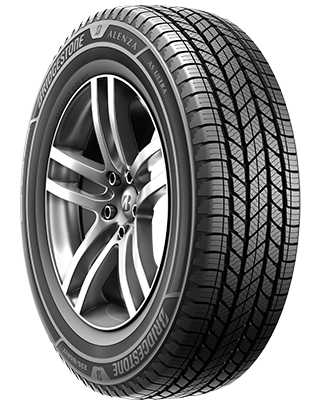
- No warranty
- All-Season
- Light Truck Tires
 Blizzak DM-V2
Blizzak DM-V2
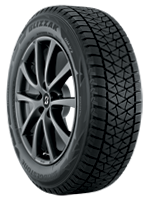
- No warranty
- Winter
- Winter
 Dueler A/T Revo 3
Dueler A/T Revo 3
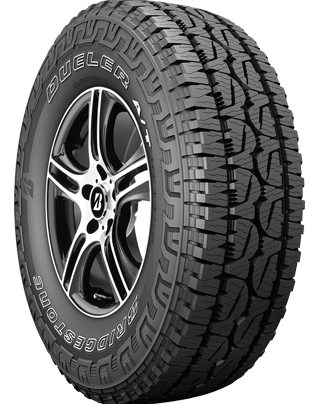
- Platinum Pact Limited Warranty
- All-Season
- Light Truck Tires
 Dueler A/T Revo 3 - LT
Dueler A/T Revo 3 - LT
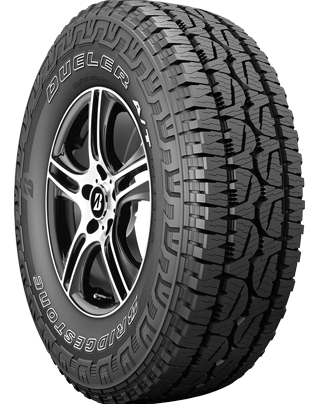
- Platinum Pact Limited Warranty
- All-Season
- Light Truck Tires
 Dueler A/T RH-S
Dueler A/T RH-S
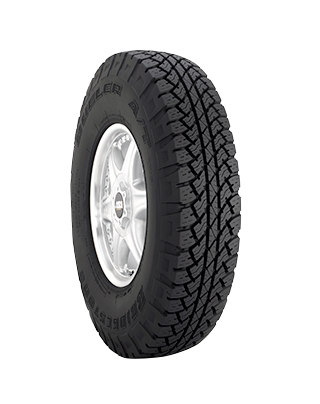
- Platinum Pact Limited Warranty
- All-Season
- Light Truck Tires
 Dueler H/T 684 II
Dueler H/T 684 II
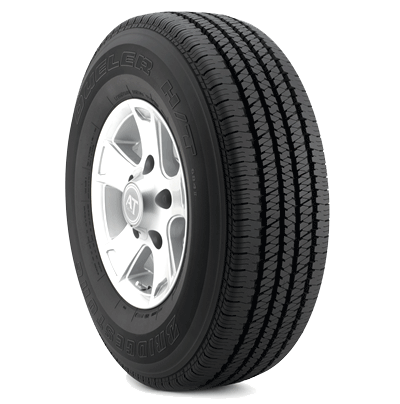
- Platinum Pact Limited Warranty
- All-Season
- Light Truck Tires
 Destination A/T2
Destination A/T2
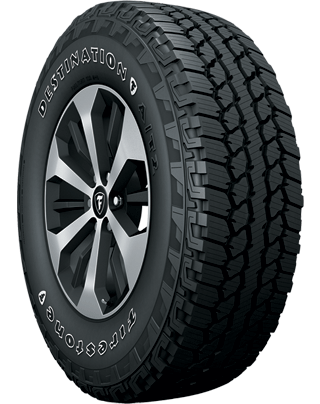
- Gold Pledge Limited Warranty
- All-Season
- Light Truck Tires
 Destination LE3
Destination LE3
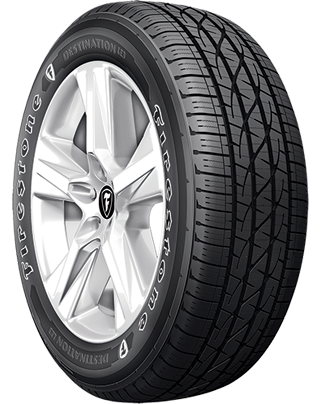
- No warranty
- All-Season
- Light Truck Tires
 Destination X/T
Destination X/T
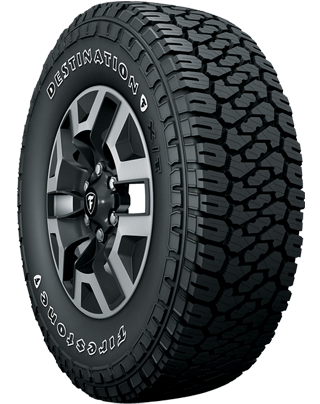
- Gold Pledge Limited Warranty
- All-Season
- Light Truck Tires
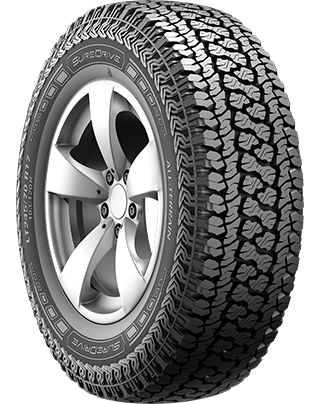
- No warranty
- All-Season
- Light Truck Tires
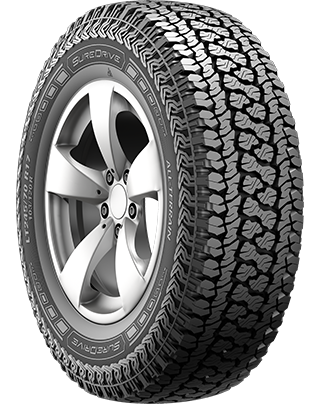
- No warranty
- All-Season
- Light Truck Tires
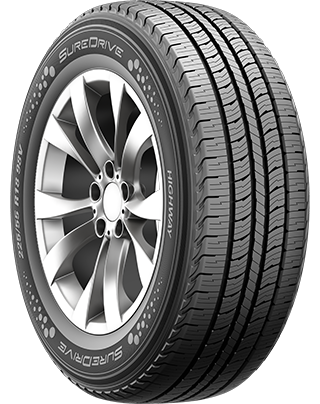
- No warranty
- All-Season
- Light Truck Tires
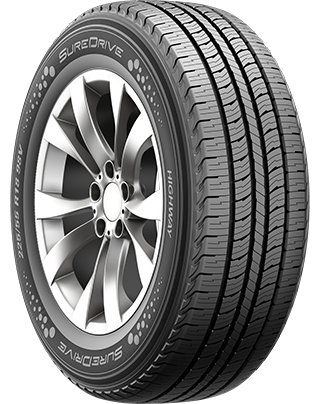
- No warranty
- All-Season
- Light Truck Tires
 OPEN COUNTRY A/T III
OPEN COUNTRY A/T III
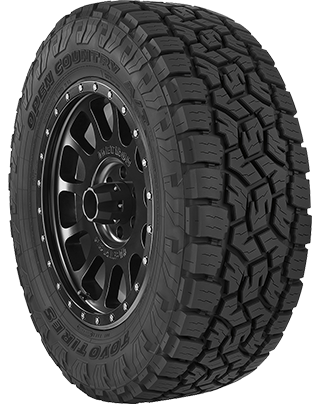
- No warranty
- All-Season
- Light Truck Tires
Choosing 2019 Toyota 4Runner Tires
Other than getting the proper tire size, you also want to consider a handful of other factors when buying new Toyota 4Runner tires like how and where you drive, and how much you want to spend. When evaluating your driving conditions, think about where you live (countryside vs. city vs. mountains) and the kind of unexpected weather you're likely to experience. Many drivers who live in states that experience all four seasons choose to purchase two sets of tires: one for summer and one for winter. Other drivers prefer to purchase one all-season set to limit trips to the tire shop and make sure their vehicle is prepared in the rain, sleet, snow, or sun!
Next, consider your driving style. If you're a big off-roading fan who forges paths where others can't, you have very different needs than a long-distance commuter who sticks to the highway. Browse Toyota 4Runner tires online or come to your nearby Firestone Complete Auto Care for help selecting the tire that's right for you.
2019 Toyota 4Runner Tire Installation & Rotation
We sell tires, but we also service them and care for all the around-the-wheel components. We're your tire shop and a complete service center for tire installation, maintenance, repair, rotation, and alignment! We make it easy to buy new 2019 Toyota 4Runner tires online and book an installation appointment at the same time.
Questions About 2019 Toyota 4Runner Tires
-
Is Toyota tire inflation important? The right tire pressure can make all the difference. Proper tire inflation helps increase fuel economy, improve braking time, and boost tire lifespan! Even a small change in tire pressure can impact your driving.
-
What do the numbers on my Toyota 4Runner tires mean? Your tire sidewall gives you information about load carrying capacity, speed rating, treadwear, traction, and tire size. Talk to one of our tire technicians to learn how to read the numbers on your tire!
-
Is there an easy way to check Toyota tire tread depth? Stay on top of your tire tread depth to help avoid a dangerous drive. You can check tread depth with a penny. Hold the penny so that Abraham Lincoln is facing you, then place your penny into a tread groove upside down. If you can see the top of Abe’s head, your tread is shallow and it might be time for new Toyota 4Runner tires. Grab a penny. Hold the so that Abe Lincon's head is facing you and his hair is pointing toward the ground. Then, place the penny into a tread groove. If you can see the top of Abe’s head, your tread is shallow and it might be time for new Toyota 4Runner tires.
2019 Toyota 4Runner Repair
When to repair, when to replace? Click on a repair below to learn more about Toyota 4Runner repairs at Firestone Complete Auto Care.
About 2019 Toyota 4Runner Repairs
For most drivers, the words “car repair” don’t exactly spark excitement. But at Firestone Complete Auto Care, we strive to give you the excellent repair experience you deserve. When it’s time for 2019 Toyota 4Runner repair services, head to your nearest Firestone location and our technicians will take care of your 4Runner like it was their own. We'll work to evaluate the scope of repairs needed and explain your options. We value your trust, so we recommend only the repairs we think are necessary for your safety on the road.
How Much Are Toyota 4Runner Repairs?
Several factors can affect the cost to repair your 2019 Toyota 4Runner, including the type of repair, prices of appropriate replacement parts, the amount of labor necessary to get the job done, and your locale. No matter what state you’re in, be sure to look through our offers and online coupons for repairs.
A few different aspects can influence repair costs for your 2019 Toyota 4Runner, like
Questions About 2019 Toyota 4Runner Auto Repairs
-
Can scheduled maintenance help me avoid repairs? One of the best ways to prevent 2019 Toyota 4Runner repairs is by staying on top of your Toyota maintenance schedule. This schedule is written by the people who made your vehicle and they know best how to keep it running smoothly.
-
What's wrong if something feels 'off' in my Toyota? You know your vehicle. You also know when something feels 'off' with your vehicle. Pay attention when things don't run like they used to and stop by for a Courtesy Check when you notice an unusual sign, smell, or sensation. We might be able to help you prevent Toyota 4Runner repairs!
-
Why do you recommend certain repairs for my Toyota? Trust is more than just a saying on the wall. It’s a window underneath it. That’s why we won’t recommend services or repairs for your 2019 Toyota 4Runner unless we think they’re vital to your safety on the road.
Brake Repair for Your 2019 Toyota 4Runner
Your Toyota 4Runner engine may be strong and reliable. But if you can’t brake, it might as well be scrap metal. Don't wait if you're experiencing brake squeaks or a loss of braking power. Safe driving is difficult when your brakes are anything but their best. What's more, waiting for things to figure themselves out can result in more damage to your brakes and your wallet. Get your 2019 Toyota 4Runner brakes fixed at Firestone Complete Auto Care. We offer many affordable brake repairs like brake pad/shoe replacement, brake rotor/drum refinishing, brake fluid exchange, and brake caliper and wheel cylinder installation.
Toyota 4Runner Brakes Questions
-
Why is my 4Runner shaking as I brake? Faulty brake calipers, worn brake pads or rotors, loose or worn suspension parts, and warped rotors can cause your 4Runner to shake during braking. If you’re experiencing odd brake behavior, schedule a free brake inspection at a nearby Firestone Complete Auto Care.
-
What is the average lifespan of 4Runner brake pads? Brake pads generally last between 30,000 and 40,000 miles. Your driving can affect how long your 4Runner brake pads last, though. For example, mainly driving on highways and gradually braking can help increase the lifespan of your brake pads, and carrying hefty loads or riding your brakes can shorten it.
-
Is it bad if my 4Runner is leaking brake fluid when off? Your 4Runner has a closed hydraulic brake system, meaning you should not have a brake fluid leak under normal conditions. However, parts of your brake system can wear out over time or become damaged, which can lead to a brake fluid leak.
Repairing Your Toyota 4Runner Drivetrain
You don't want to go to just anyone for drivetrain repair. Drivetrains for front, rear, and all-wheel-drive and 4WD vehicles are all different. You want to go to Firestone Complete Auto Care. We can take care of most 2019 Toyota 4Runner drivetrain components Your 4Runner might need driveshaft repair if you notice clunks when shifting, vibration as your vehicle accelerates, resistance when turning, or heavy vibrations in your floorboards.
Questions About 2019 Toyota 4Runner
-
What are the symptoms of a damaged Toyota drivetrain system? Noises toward the back of your Toyota 4Runner, leaking fluid, trouble turning — these could all be signs of drivetrain damage you want to address. Take action before something more severe happens.
-
Why is my 4Runner malfunction indicator light (MIL) on? Engine problems, transmission problems, faulty sensors, electrical issues, misfire issues, and connector problems could all cause your 4Runner’s malfunction warning light, or better known as the check engine light, to illuminate.
-
How worried should I be about a drivetrain malfunction in my 4Runner? A drivetrain malfunction in your 4Runner should never be taken lightly. Driving with a malfunctioning drivetrain can put you in danger and lead to further vehicle damage, so it's essential to have a qualified mechanic assess and repair the problem as soon as possible.
2019 Toyota 4Runner Wheel Alignment
Alignment services involve precise adjustments to your Toyota 4Runner’s suspension system, which connects the wheels with the rest of the vehicle. During the service, the individual angles of your tires are adjusted so that they come into contact with the road in just the right way — the way Toyota intended them to. Bring your 2019 Toyota 4Runner in for a wheel alignment and we'll start with an alignment check. If needed, we'll adjust your wheel alignment angles to match Toyota recommendations.
Answers to Toyota 4Runner Alignment Questions
-
What can knock my Toyota 4Runner out of alignment? Potholes and uneven roads can knock your car out of alignment, so stay aware of the road ahead and adjust your speed (or avoid these obstacles whenever it’s safely possible).
-
How often should you get a wheel alignment for your 4Runner? Generally, it’s wise to have your alignment looked at around every 6,000 miles or 6 months, whichever happens first. You should check your 4Runner owner’s manual to verify Toyota’s suggested interval.
-
Does getting new 4Runner tires mean you need an alignment? While you don’t necessarily need to get an alignment when putting new tires on your 4Runner, it’s still a good idea. Ensuring your wheels are properly aligned can help support optimal handling, tire wear, and fuel efficiency.
Engine Repairs for Your 2019 Toyota 4Runner
If your 2019 4Runner engine needs repairs, our technicians will provide you with a thorough explanation beforehand. We don't start working until we have your approval. If a service can wait, we’ll make sure you know. If it's necessary for your safety, we'll make sure you understand that, too. We want to provide you with the information you need to make an informed engine repair decision. Turn to Firestone Complete Auto Care for your 2019 4Runner engine repairs and you can feel good knowing that we only use Toyota-compliant replacement parts such as the timing chain or belt, valve guide seal, fuses, or another part.
Questions About 2019 Toyota 4Runner Engines
-
Why does my 4Runner’s check engine light come on when I start it? It's okay if your check engine light comes on when you first start your vehicle. This is a sign that your vehicle is testing its circuits. The light should go off shortly. Bring your vehicle in if it doesn't.
-
Why is my Toyota 4Runner making engine noise? Strange engine sounds can be a sign something’s off in your Toyota 4Runner. Knocking or tapping could be a symptom of low oil. A high-pitched whistle could signal an intake leak or misaligned belt. Squealing can be traced back to a loose fan belt, and grinding might be a sign of brake problems rather than engine issues.
-
What could damage my Toyota 4Runner engine? Some driving habits are not so great for your engine. These include driving on a near-empty gas tank, flooring the gas pedal while the car is in Park, or accelerating too quickly, too soon. Protect your engine’s performance and efficiency by distancing yourself from these habits.
Tire Repair for Your 2019 Toyota 4Runner
If your 2019 Toyota 4Runner is in need of a tire inspection or possible flat tire repair, Firestone Complete Auto Care has your back. There’s a chance your tire could be plugged and patched (rather than replaced). Our technicians can inspect your tire and let you know if it is safe to repair. We’ll begin by taking a look at where the damage is, the type and extent of the tire damage, and how all of your tires are wearing.
If a repair on your 2019 Toyota 4Runner tire is feasible and safe, the repair process is actually fairly simple: (1) Take the tire off the wheel for easy inspection, (2) fill the puncture to keep the moisture out, and (3) secure and seal the inner tire liner to ensure the tire is airtight.
Your Questions About Toyota 4Runner Tire Repair, Answered
-
What happens if I drive my Toyota on a flat tire? Driving on a flat tire is not a good idea. Your 4Runner engine will keep running with a flat tire, but you could damage your wheel by continuing to drive on a flat.
-
Can I use an emergency/temporary sealant to fix my Toyota's flat tire? Temporary sealants will solve your problem… for a little bit. If you’ve seen temporary or emergency tire sealant before (it usually comes in a can), it can be tempting to turn to this as a solution for your flat tire. Keep in mind that these fixes could buy you some time to get to Firestone Complete Auto Care for a proper repair, but they could also cause some harm in the process (for example, damage to your TPMS). Plus, using a product like this could void your tire warranty.
-
Why do the tires on my 4Runner keep losing air? Your 4Runner tires might keep losing air due to a leaking valve stem, puncture or hole in the tire tread or sidewall, or damaged wheel.
Maintenance for Your 2019 Toyota 4Runner
Take care of your Toyota 4Runner and it'll take care of you. With the right maintenance at the right time, your 4Runner has a good chance of hitting 200,000 miles or more.
2019 Toyota 4Runner Maintenance Schedule
What is the manufacturer recommended maintenance schedule for a 2019 Toyota 4Runner? Find maintenance info for your vehicle.
2019 Toyota 4Runner Maintenance Information
It can be overwhelming, but fortunately, there’s a resource that takes the guesswork out of routine 4Runner maintenance. It’s as easy as following the recommended maintenance schedule that’s been written specifically for your 2019 Toyota 4Runner! This recommended maintenance schedule is written by the auto manufacturer, Toyota themselves. Scheduled maintenance services can vary depending on driving conditions, climate, and other factors; in most cases, though, recommended maintenance will consist of services like fluid exchanges, filter changes, new brake pads, oil changes, and tire rotations. Scheduling routine service appointments is one of the best ways to help extend your 4Runner's life, keep you safer on the road, and prevent common 2019 Toyota 4Runner problems.
Overview of Essential Toyota 4Runner Maintenance Needs
Head to your nearest Firestone Complete Auto Care in your 2019 Toyota 4Runner for factory-recommended routine maintenance and our technicians will jump right in with a Courtesy Check. The Courtesy Check helps us see what we’re working with under the hood, and allows us to alert you to any potential problems before they worsen. During a Courtesy Check, we’ll always check your battery, then we’ll move on to inspect your 4Runner’s head and tail lights, tires, fluid levels, alignment, and windshield wipers.
Firestone Complete Auto Care is the place to go for 2019 Toyota 4Runner maintenance. So visit us regularly, or visit us urgently. Many locations are open on weekends and in the evening.
2019 Toyota 4Runner Maintenance Q&A
-
What do I do if I hit a pothole in my Toyota 4Runner? Watch out for pothole damage. If your 2019 4Runner is pulling to one side or the other, your tires or suspension system could be calling out for help.
-
When should I switch my Toyota 4Runner to high mileage oil? If your Toyota 4Runner has ticked past 75,000 miles, consider switching to high mileage oil at your next oil change to give your engine what it needs to go another 75,000 (or more!). High mileage oil: make it a high priority!
-
Can I ignore dashboard lights on my Toyota? Don't ignore dashboard warning lights! Bring your Toyota 4Runner in for a diagnostic code scan as soon as a dashboard warning light flashes on, whether it's your check engine or battery light. Dashboard lights alert you to trouble under the hood.
Battery Size & Replacement for 2019 Toyota 4Runner
Need more info about Toyota 4Runner batteries?
| Battery | Engine | Warranty | Cold Cranking Amps | |
|---|---|---|---|---|
| 24F-3 | V6/4.0L | Replacement 24 months | Performance months | 650 |
| 24F-6 | V6/4.0L | Replacement 36 months | Performance months | 750 |
| 24F-RP | V6/4.0L | Replacement 48 months | Performance months | 750 |
2019 Toyota 4Runner Car Batteries
On average, auto batteries last anywhere from three to five years. You want to replace your 2019 Toyota 4Runner battery before it fails and leaves you stranded. Watch for signs that your current battery is getting too old or too weak. A lagging starter, a blinking battery or check engine light, bloated battery case, corroded battery terminals, and subpar electrical performance may all indicate that your battery is waving goodbye.
Plus, at Firestone Complete Auto Care, we’ll test your battery for free. Drop in for a free battery check and, if needed, a replacement battery for your 2019 Toyota 4Runner. Automotive batteries are just one of our many areas of expertise. Our expert technicians understand Toyota service recommendations for 4Runner battery CCAs and reserve capacity. Get help choosing the battery size that fits your car perfectly, and schedule a weekday or weekend battery replacement service for your car.
Answers to Your Toyota 4Runner Car Battery Questions
-
Why won’t my Toyota 4Runner battery hold a charge? A battery that won't hold a charge is almost as good as dead. The battery might be old. Or, you may have a habit of leaving your car doors open and the lights on overnight. Stop by for a free battery test at your local Firestone Complete Auto Care to learn more about the state of your battery.
-
How long can I expect my car battery to last? A car battery normally lasts three to five years, but this number can vary based on battery type, your driving habits, and battery maintenance.
-
Why is there white, crusty buildup on my 4Runner’s battery post? The white, crusty stuff that can accumulate around 4Runner car battery terminals is called corrosion. It is caused by a chemical reaction between the battery acid and the air, which creates a white, powdery substance that can build up on the terminals over time. Corrosion can interfere with the flow of electricity between the battery post and the car's electrical system, sometimes leading to poor electrical performance, difficulty starting, and even premature battery failure.
2019 Toyota 4Runner Oil Change Service
Toyota recommends changing your 2019 4Runner’s oil at regular intervals. Your 4Runner may need an oil change right away if your check engine/oil change light is on, you hear knocking sounds coming from the engine, smell oil inside the vehicle, or notice excess vehicle exhaust. You might need an oil change more frequently than what’s recommended by Toyota if you regularly haul heavy loads, drive in dusty areas, enjoy off-roading, or go long distances at low speeds.
Whether it’s synthetic, conventional, or a blend of both — your local Firestone Complete Auto Care has the right oil for your Toyota 4Runner. Talk with a teammate and consult your owner's manual before picking a motor oil. At Firestone Complete Auto Care, you can choose from the following oils: Quaker State® Advanced Durability™ conventional oil, Pennzoil® High Mileage Vehicle® motor oil, Pennzoil Platinum® Full Synthetic motor oil with PurePlus™ Technology, and Shell Rotella® heavy-duty engine oil. During your oil change service, an auto technician will change your 4Runner’s oil, replace and recycle the old oil and filter, inspect all of your other filters, top-off essential fluids, and perform a courtesy inspection on your entire vehicle. Let the experts take care of your 4Runner’s engine by making an oil change appointment today.
Oil Change Q&A for Your 2019 Toyota 4Runner
-
Why is the oil light on in my Toyota 4Runner? Your Toyota 4Runner oil change reminder light may come on if you're overdue for an oil change. The oil pressure light will typically come on if the oil level in the engine is too low, the oil pump is failing, you have a clogged oil filter, or there's a faulty oil pressure sensor.
-
Can I change my Toyota oil on my own? First off, changing your own oil isn’t as easy as you’d think. You’ll have to buy special tools and figure out a way to recycle the old oil properly. Getting a professional oil change reduces the risk of something going wrong during the service, but also helps your car perform down the road.
-
Why is my Toyota 4Runner exhaust smoke grayish or blue? There could be an oil leak and your engine is burning oil. Time to have a qualified technician check things out. The leak could be caused by several issues like leaking valve seals, damaged piston rings, or worn cylinder walls.
Engine Tune-Up Service for Your 2019 Toyota 4Runner
Regular engine tune-ups can optimize your 4Runner’s power on the road. Your local Firestone Complete Auto Care offers a range of engine tune-up services for your 2019 Toyota 4Runner. The first is the standard Firestone Tune-Up. It includes a complete visual inspection of engine components, installation of new spark plugs, and a lifetime warranty on parts*. The second service focuses on your 4Runner's filters, specifically replacing the air filter and fuel filter. The third tune-up option is a fuel system cleaning service, which is a three-step process that removes varnish, dirt, and carbon deposits on your 4Runner's fuel injectors, throttle body, and throttle plate. This can improve your fuel system’s performance (and therefore, your engine’s performance). Consider this when choosing a tune-up service for your 4Runner: your vehicle’s maintenance record and mileage can determine which service is best. Talk to a technician about your driving style, mileage, and service history to learn more about your vehicle's specific needs.
*Talk to a Firestone Complete Auto Care teammate for full terms and conditions on warranties.
2019 Toyota 4Runner Engine Tune-Up Q&A
-
What happens if my Toyota 4Runner spark plugs fail? When it’s time to replace the spark plugs, don’t delay. These small (but vital!) parts provide the electric spark that your car needs in order to start, and old spark plugs can prevent your car from starting at all. Replace spark plugs on time or about every 30,000 miles or so.
-
What should I do if I see leaks under my 4Runner? Puddles could indicate an oil leak, coolant leak, or brake fluid leak– all of which can critically hurt your engine. Have your engine inspected as soon as you spot a pool of liquid in your usual parking spot.
-
How often should I clean my Toyota 4Runner fuel injectors? The frequency at which car fuel injectors should be cleaned can vary depending on several factors, including the type of fuel used and the driving conditions. Some manufacturers generally recommend a fuel system cleaning as part of your general car maintenance, or as needed based on symptoms of poor fuel system performance.
2019 4Runner Toyota Steering & Suspension Services
When you first bought your 2019 Toyota 4Runner, you and your passengers probably enjoyed a ride that was smooth and balanced. Now, however, things are starting to feel a little rough. Perhaps your 4Runner feels bouncy, leans to one side, or makes noise whenever you turn or drive over a speed bump. The first sign of trouble is the best time to bring your 2019 Toyota 4Runner in for steering and suspension services. We'll get to the root of the problem and, if your car needs steering and suspension repairs, we’ll explain what your car needs and how much it’ll cost to get it done. We won't begin any work without your permission.
2019 4Runner Steering & Suspension Q&A
-
Why is my Toyota 4Runner bouncing excessively? Excessive bouncing in your Toyota 4Runner might be due to damaged struts or shocks that are unable to absorb road bumps effectively, causing your vehicle to feel more like a pogo stick than a smooth ride.
-
Why does my 4Runner tilt forward when I hit the brakes? As you brake, the forward momentum of your 4Runner combined with its weight sends a ton of force to its front end. A damaged or worn suspension system can cause the front end to compress and dip even further.
-
Does treadwear and tire pressure impact my 4Runner's steering and suspension? Maintaining your tires can help reduce strain on the suspension, nd also let you know when it's time to replace your tires. A faltering steering and suspension system could lead to uneven tire wear.
2019 Toyota 4Runner A/C Service Near You
Our trained technicians will do what they can to solve your 2019 Toyota 4Runner A/C problems. During an A/C performance check, we'll determine the condition of your 2019 Toyota 4Runner A/C system to determine whether repair work is needed. This check includes a visual inspection, performance test, and pressure and leak test.
Let's say we repair your 2019 Toyota 4Runner A/C system. We will also perform an A/C evacuation and recharge. To start this process, a technician will flush out the old refrigerant from your vehicle’s A/C system. Then, they’ll use Toyota’s specifications to evacuate the system. To finish, we’ll add new refrigerant to recharge the A/C system.
Questions About 2019 Toyota 4Runner A/C Systems
-
Why is my 4Runner A/C blowing hot air? If your car’s air conditioning isn’t blowing cold air at all (or it tries, then turns warm), you could have a clogged expansion valve, a faulty compressor clutch, a leak, or a malfunctioning fuse in the system.
-
What causes A/C system leaks? A/C system leaks are often due to a combination of age and moisture. Rubber seals and gaskets naturally degrade over time, allowing refrigerant to exit and moisture to enter your 4Runner's A/C system.
-
Why does my vehicle have to be moving for my 4Runner’s A/C to work? There could be issues with one or more components in the air conditioning or electrical system. Your 4Runner may have a faulty cooling fan or low refrigerant.
2019 Toyota 4Runner Transmission Service & Repairs
The transmission delivers power from the engine to the wheels so that you can drive on your terms. Because your transmission is responsible for converting the right amount of power into the right amount of speed, a small transmission issue can put a big dent in your 4Runner’s performance. 2019 Toyota 4Runner transmission problems can show up as shifting delays, jumping or grinding during acceleration, the car shaking on the road, or whistling noises and a burning smell coming from under the hood. If you ignore Toyota 4Runner transmission issues your could suffer a loss in fuel efficiency or find that your 4Runner isn’t working at all. Our technicians know how to service your 2019 4Runner up to Toyota-recommended standards. As soon as you suspect something’s wrong with your 4Runner’s transmission, book an appointment at your local Firestone Complete Auto Care to help diagnose, treat, and prevent major transmission issues.
2019 Toyota 4Runner Transmission Q&A
-
When should I have my 4Runner's transmission fluid checked or exchanged? Caring for your Toyota 4Runner’s transmission fluid is a great way to help it perform. About every 30,000 to 60,000 miles is a good timeframe for having your transmission fluid inspected and perhaps changed. Service intervals can vary depending on how you use your Toyota, so check with your technician first. Luckily, leaks and low fluid levels are easy to spot and inexpensive to fix.
-
Can my Toyota 4Runner leak transmission fluid? Yes, your Toyota 4Runner can develop a transmission fluid leak. As your 4Runner ages, parts of the transmission system might wear out or break down, leading to a leak and possible transmission issues. Common causes of transmission fluid leaks include worn seals, a damaged transmission housing, a loose or cracked transmission pan, an overfilled transmission, or faulty transmission lines.
-
Should I avoid driving my Toyota 4Runner if there is a transmission fluid leak? It’s not advisable to drive your 4Runner if it’s leaking transmission fluid. Your transmission system needs transmission fluid to function properly, and a leak can lead to significant problems, such as overheating or reduced performance. You might even experience transmission failure.
Vehicle Inspection for 2019 Toyota 4Runner
Every service performed at Firestone Complete Auto Care includes a multi-point Courtesy Check. To start, one of our technicians will check the battery in your Toyota 4Runner to determine how much charge remains. After we’ve inspected your Toyota 4Runner’s battery, we’ll visually inspect your windshield wiper blades, lights, filters, hoses, alignment, tires, fluid levels, and belts.
We perform a Courtesy Check any time you bring your car to a local Firestone Complete Auto Care for service, but we also offer an in-depth Complete Vehicle Inspection for your 2019 Toyota 4Runner. In addition to a visual check of everything that's included in a Courtesy Check, a Complete Vehicle Inspection also includes a thorough manual inspection of your exhaust system, steering and suspension, and brakes. The goal of this type of inspection is to unearth significant issues that might require preventative maintenance.
Depending on your location, you may be able to take care of your state inspection or safety test at your local Firestone Complete Auto Care. These inspections are governed by state automotive laws and may vary in different locations.
Common 2019 Toyota 4Runner Vehicle Inspection Questions
-
How do I know if I should have an inspection on my Toyota 4Runner? It needs a check-up if something feels 'off' to you, the driver. Your Toyota 4Runner could benefit from a Courtesy Check if it has any illuminated dashboard lights, you hear weird noises coming from any part, the engine doesn't start sometimes, or your vehicle pulls to one side.
-
My 2019 Toyota 4Runner failed the state inspection test. Can you fix it? There's a good chance we can. Stop by for a full system inspection and we'll get to the root of the issue.
-
When’s the best time to have a complete vehicle inspection performed on my Toyota 4Runner? The best time to have a complete vehicle inspection done on your Toyota 4Runner is when you notice something is off but you can’t locate the issue yourself. Schedule an inspection if you experience any unusual symptoms, such as unfamiliar dashboard indicators, strange engine noises, or steering changes. An inspection can be especially beneficial before a road trip for the simple peace of mind. You can feel confident in your adventure!
Radiator Service & Repair for 2019 Toyota 4Runner
Keeping up with regular radiator maintenance in your 2019 Toyota 4Runner is a huge factor in the longevity of your engine. To keep your radiator functioning, Toyota recommends replacing your antifreeze or coolant at scheduled intervals but it’s a good idea to keep your eyes open for any indication that your radiator is failing. Your radiator could be close to causing an engine breakdown if you notice leaking coolant, overheating, or an illuminated low coolant dashboard light.
When you come to Firestone Complete Auto Care, we’ll begin your radiator repair with an in-depth inspection of the cooling system in your Toyota 4Runner. Then, we’ll move on to a machine-powered coolant exchange. Finally, we’ll refill the flushed sealants, lubricants and chemicals, then do a pressure check to catch any possible leaks. If you’re about to lose your cool over a too-hot engine, rest assured that we’re here to give your 2019 Toyota 4Runner the top-notch service it needs.
2019 Toyota 4Runner Radiator Q&A
-
What does an illuminated coolant temperature light mean for my Toyota? Pay attention to the temperature gauge and lights on your dashboard. If a low coolant warning light comes on or your dashboard temperature gauge keeps rising, it’s likely that your engine is about to overheat (and could leave you stranded on the road). Wait for the engine to cool down, then have your coolant system checked immediately at your nearest Firestone Complete Auto Care.
-
Why is my 4Runner overheating? Low coolant, a damaged cooling fan, a faulty water pump, a malfunctioning thermostat, or a clogged radiator could all cause your Toyota 4Runner engine to overheat.
-
My 4Runner radiator sounds like it's rumbling or boiling! What's up? Air pockets in your 4Runner’s cooling system may cause a rumbling or boiling noise. You could also have a clogged radiator or simply need to replace the radiator cap.